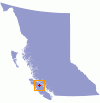Gold River is home to the Upana Caves, combined number of honeycomb passages totaling a length of over four hundred meters of limestone rock, located only seventeen kilometers west of Gold River.
This beautiful area is situated between the renowned Strathcona Provincial Park and the Great Lands of Maquinna. A land which is rich in history dating to a time where its was the treasured home of the Nuu-chah-nulth First Nations aboriginals. Spiritual presence and mystic swells of mist and morning silences are the current reminders of a place of discovery. Visitors find these enriching moments in many recreational locations - on the water; by kayak, canoe or fishing charter, and on foot through towering old growth forests, along the sandy rocky seasides or the sparkling fresh lake waters. The peace is deeply rooted.
Pleasure boaters and sailing boats fill the marina each year with visitors from all over the southern and northern coast lines of North America.
Population: 1,400+
Highlights:
Yuquot - the ancestral home of the Mowachaht people
The Nootka Trail.
The Conuma River Hatchery
Buttle Lake
Historic Cross Island Trail
Gold River - steelhead runs (2 per annum)
Strathcona Provincial Park - camp grounds available
The Muchalat Lake Recreation Site - unserviced camp grounds
The Ralph River Campground - the Wild Ginger and Shepard Creek walking trails
Elk River Trail
White Ridge Provincial Park
Gold Muchalat Provincial Park
Fresh Lake fishing - rainbow trout
The MV Uchuck III - kayak / canoe island & Nootka Sound excursions
History:
Dating back centuries, the area around Gold River was, and still is, the traditional territory of the First Nations Nuu-chah-nulth bands - the Mowachaht (whalers) and the Muchalaht people.
Gold River later gained its name from a river (whose gold had been emptied by the Chinese years earlier), but was finally named by the Spaniards who arrived in the late 1780's - Rio del Oro, meaning river of gold. Trade furs, tools, and supplies was the mainstay relations between the Spaniard and local natives of that time.
Climate:
Summer average 19 degrees Celsius
Winter average 3 degrees Celsius

